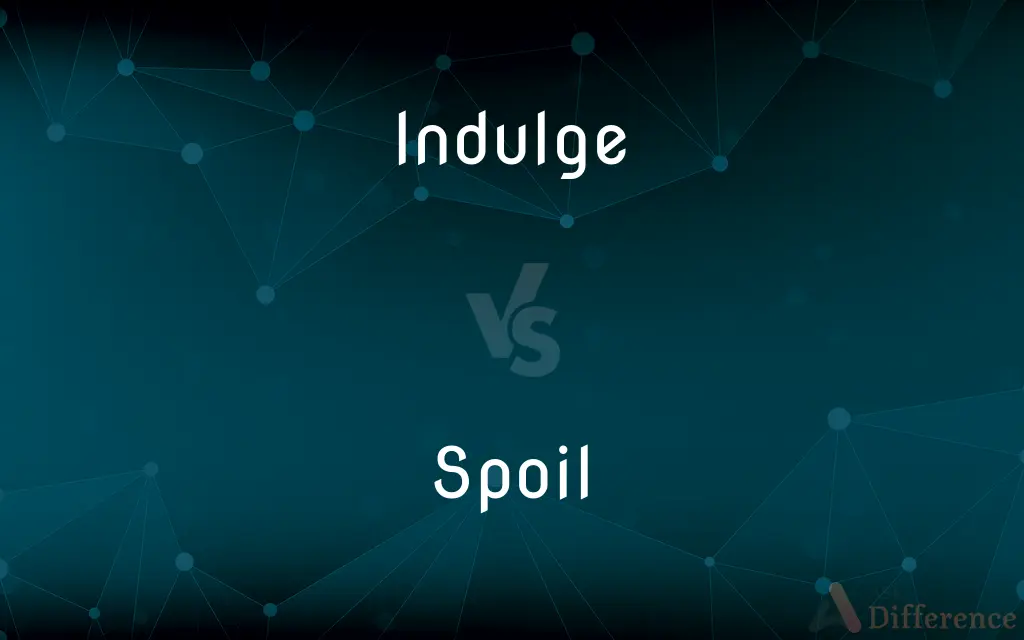Indulge vs. Spoil — What's the Difference?
By Fiza Rafique & Urooj Arif — Updated on April 6, 2024
Indulging implies treating oneself or others with luxury or pleasure in moderation, while spoiling often refers to excessive indulgence that can lead to negative consequences.

Difference Between Indulge and Spoil
Table of Contents
ADVERTISEMENT
Key Differences
Indulging is about allowing oneself or others to enjoy something special or luxurious occasionally, without overdoing it. It's often seen in a positive light, suggesting a balanced approach to pleasure. On the other hand, spoiling implies going beyond moderation, often leading to negative effects such as entitlement or lack of appreciation for what one has. Spoiling can diminish the value of indulgence by making it excessive or commonplace.
Indulgence can be a form of self-care or rewarding oneself for achievements, creating a sense of balance and well-being. It can enhance life's enjoyment without leading to negative consequences. Whereas spoiling, especially when it involves children or oneself, can lead to a sense of entitlement and a lack of discipline, making it harder to appreciate or work for rewards.
In the context of treating others, indulgence is often viewed as a thoughtful gesture, showing affection or appreciation through special treats or experiences. It's about giving in a way that brings joy and strengthens relationships. Spoiling, however, can undermine personal development by removing the incentive to strive and achieve, potentially leading to strained relationships due to unrealistic expectations.
Indulgence respects boundaries and acknowledges the importance of moderation for long-term happiness and satisfaction. It's about enjoying life's pleasures without compromising one's health, relationships, or responsibilities. Spoiling disregards these boundaries, leading to overconsumption, dependency, and in the long run, dissatisfaction.
Both indulging and spoiling reflect approaches to pleasure and reward. Indulging does so in a way that maintains balance and appreciation, while spoiling risks overshadowing these positive aspects with excess and potential harm, illustrating the importance of moderation in pursuit of happiness.
ADVERTISEMENT
Comparison Chart
Definition
Allowing oneself or others to enjoy a pleasure.
Excessive indulgence leading to negative consequences.
Connotation
Positive, implies moderation and self-care.
Negative, associated with overindulgence and lack of discipline.
Impact on Relationships
Strengthens through thoughtful gestures of love and appreciation.
Can strain by fostering entitlement and unrealistic expectations.
Long-term Effects
Enhances enjoyment and satisfaction from life's pleasures.
Leads to diminished appreciation and potential dependency.
Role in Personal Development
Encourages balance and self-reward, contributing to overall well-being.
May hinder development by removing incentive for self-improvement and achievement.
Compare with Definitions
Indulge
To allow oneself to enjoy a pleasure or luxury.
She decided to indulge in a spa day after a week of hard work.
Spoil
To harm the character of a child by being too lenient or indulgent.
Constantly giving in to her demands could spoil her, making discipline difficult later.
Indulge
Giving in to one's desires in a measured way.
He indulged in his favorite dessert, knowing he'd worked hard at the gym.
Spoil
Ruining or diminishing the value of something by overindulgence.
Spoiling your appetite with snacks before dinner is a bad habit.
Indulge
To satisfy or fulfill a desire.
He indulged his interest in photography by taking a weekend course.
Spoil
Excessive indulgence that leads to adverse outcomes.
Spoiling a pet can lead to behavioral problems.
Indulge
Treating oneself or others with special kindness.
On their anniversary, they indulged in a gourmet dinner at a fancy restaurant.
Spoil
Overwhelming with excessive attention or luxuries.
Lavishing too many gifts on birthdays can spoil children, making them expect too much.
Indulge
Permitting a treat or luxury occasionally.
They indulge their children with new books as a reward for good grades.
Spoil
Making someone less appreciative by not setting limits.
Spoiling him with constant praise made it hard for him to handle criticism.
Indulge
To yield to (a desire or whim); gratify
Indulge a craving for chocolate.
Spoil
To impair or destroy the quality or value of; ruin
Spoiled the dish by adding too much salt.
Indulge
To yield to the desires or whims of (someone), often excessively
We indulged our daughter on her birthday.
Spoil
To impair or destroy the enjoyment or experience of
Spoiled the movie by talking throughout it.
Indulge
Roman Catholic Church To grant an ecclesiastical indulgence or dispensation to.
Spoil
To reveal details about (a movie or a book, for example) before someone has a chance to discover these details on their own
The article spoiled the next episode of my favorite TV show.
Indulge
To indulge oneself
Eyed the desserts but didn't indulge.
Spoil
To harm the character of (a child) by overindulgence or leniency.
Indulge
To engage or take part, especially freely or avidly
Indulged in outrageous behavior.
Indulged in all the latest fads.
Spoil
To plunder; despoil.
Indulge
: To yield to a temptation or desire.
He looked at the chocolate but didn't indulge.
I indulged in drinking on the weekend.
Spoil
To take by force.
Indulge
(transitive) To satisfy the wishes or whims of.
Grandma indulges the kids with sweets.
I love to indulge myself with beautiful clothes.
Spoil
To become unfit for use or consumption, as from decay. Used especially of perishables, such as food.
Indulge
To give way to (a habit or temptation); to not oppose or restrain.
To indulge sloth, pride, selfishness, or inclinations
Spoil
Goods or property seized from a victim after a conflict, especially after a military victory.
Indulge
To grant an extension to the deadline of a payment.
Spoil
Incidental benefits reaped by a winner, especially political patronage enjoyed by a successful party or candidate.
Indulge
To grant as by favour; to bestow in concession, or in compliance with a wish or request.
Spoil
An object of plunder; prey.
Indulge
To be complacent toward; to give way to; not to oppose or restrain
Hope in another life implies that we indulge ourselves in the gratifications of this very sparingly.
Spoil
Refuse material removed from an excavation.
Indulge
To grant as by favor; to bestow in concession, or in compliance with a wish or request.
Persuading us that something must be indulged to public manners.
Yet, yet a moment, one dim ray of lightIndulge, dread Chaos, and eternal Night!
Spoil
(Archaic) The act of plundering; spoliation.
Indulge
To indulge one's self; to gratify one's tastes or desires; esp., to give one's self up (to); to practice a forbidden or questionable act without restraint; - followed by in, but formerly, also, by to.
Spoil
To strip (someone who has been killed or defeated) of their arms or armour.
Indulge
Give free rein to;
The writer indulged in metaphorical language
Spoil
To strip or deprive (someone) of their possessions; to rob, despoil.
Indulge
Yield (to); give satisfaction to
Spoil
To plunder, pillage (a city, country etc.).
Indulge
Enjoy to excess
Spoil
To carry off (goods) by force; to steal.
Indulge
Treat with excessive indulgence;
Grandparents often pamper the children
Let's not mollycoddle our students!
Spoil
(transitive) To ruin; to damage (something) in some way making it unfit for use.
Spoil
(transitive) To ruin the character of, by overindulgence; to coddle or pamper to excess.
Spoil
(intransitive) Of food, to become bad, sour or rancid; to decay.
Make sure you put the milk back in the fridge, otherwise it will spoil.
Spoil
(transitive) To render (a ballot paper) invalid by deliberately defacing it.
Spoil
(transitive) To reveal the ending or major events of (a story etc.); to ruin (a surprise) by exposing it ahead of time.
Spoil
(aviation) To reduce the lift generated by an airplane or wing by deflecting air upwards, usually with a spoiler.
Spoil
(Also in plural: spoils) Plunder taken from an enemy or victim.
Spoil
(archaic) The act of taking plunder from an enemy or victim; spoliation, pillage, rapine.
Spoil
(uncountable) Material (such as rock or earth) removed in the course of an excavation, or in mining or dredging. Tailings. Such material could be utilised somewhere else.
Spoil
To plunder; to strip by violence; to pillage; to rob; - with of before the name of the thing taken; as, to spoil one of his goods or possessions.
My sons their old, unhappy sire despise,Spoiled of his kingdom, and deprived of eyes.
Spoil
To seize by violence; to take by force; to plunder.
No man can enter into a strong man's house, and spoil his goods, except he will first bind the strong man.
Spoil
To cause to decay and perish; to corrupt; to vitiate; to mar.
Spiritual pride spoils many graces.
Spoil
To render useless by injury; to injure fatally; to ruin; to destroy; as, to spoil paper; to have the crops spoiled by insects; to spoil the eyes by reading.
Spoil
To practice plunder or robbery.
Outlaws, which, lurking in woods, used to break forth to rob and spoil.
Spoil
To lose the valuable qualities; to be corrupted; to decay; as, fruit will soon spoil in warm weather.
Spoil
That which is taken from another by violence; especially, the plunder taken from an enemy; pillage; booty.
Gentle gales,Fanning their odoriferous wings, dispenseNative perfumes, and whisper whence they stoleThose balmy spoils.
Spoil
Public offices and their emoluments regarded as the peculiar property of a successful party or faction, to be bestowed for its own advantage; - commonly in the plural; as, to the victor belong the spoils.
From a principle of gratitude I adhered to the coalition; my vote was counted in the day of battle, but I was overlooked in the division of the spoil.
Spoil
That which is gained by strength or effort.
Each science and each art his spoil.
Spoil
The act or practice of plundering; robbery; waste.
The man that hath no music in himself,Nor is not moved with concord of sweet sounds,Is fit for treason, stratagems, and spoils.
Spoil
Corruption; cause of corruption.
Villainous company hath been the spoil of me.
Spoil
The slough, or cast skin, of a serpent or other animal.
Spoil
(usually plural) valuables taken by violence (especially in war);
To the victor belong the spoils of the enemy
Spoil
The act of spoiling something by causing damage to it;
Her spoiling my dress was deliberate
Spoil
The act of stripping and taking by force
Spoil
Make a mess of, destroy or ruin;
I botched the dinner and we had to eat out
The pianist screwed up the difficult passage in the second movement
Spoil
Become unfit for consumption or use;
The meat must be eaten before it spoils
Spoil
Alter from the original
Spoil
Treat with excessive indulgence;
Grandparents often pamper the children
Let's not mollycoddle our students!
Spoil
Hinder or prevent (the efforts, plans, or desires) of;
What ultimately frustrated every challenger was Ruth's amazing September surge
Foil your opponent
Spoil
Have a strong desire or urge to do something;
She is itching to start the project
He is spoiling for a fight
Spoil
Destroy and strip of its possession;
The soldiers raped the beautiful country
Spoil
Make imperfect;
Nothing marred her beauty
Common Curiosities
How does indulgence affect personal well-being?
Indulgence, when practiced in moderation, can positively affect personal well-being by providing satisfaction and balance.
Why is moderation important in indulgence?
Moderation prevents indulgence from becoming spoiling, maintaining the positive aspects of treating oneself or others.
What role does spoiling play in relationships?
Excessive spoiling can strain relationships by creating unrealistic expectations and dependency.
What is the key difference between indulging and spoiling?
Indulging is enjoying pleasures in moderation, while spoiling involves excessive indulgence that can lead to negative consequences.
How can spoiling affect one's appreciation for things?
Spoiling can make one less appreciative of both the value of things and the effort required to obtain them, leading to a lack of gratitude.
Can indulging ever lead to spoiling?
Yes, when indulgence becomes excessive and lacks moderation, it can turn into spoiling, leading to negative effects.
How can one indulge responsibly?
Responsible indulgence involves setting boundaries, ensuring moderation, and being mindful of the long-term effects of one's actions.
Is there a way to spoil someone positively?
Positive spoiling focuses on occasional indulgences that are thoughtful and do not undermine personal development or appreciation.
Is spoiling always bad?
While spoiling is generally viewed negatively because it can lead to entitlement or lack of appreciation, occasional overindulgence with awareness and control may not have lasting negative impacts.
What are the long-term effects of spoiling a child?
Long-term effects can include difficulty dealing with disappointment, a sense of entitlement, and challenges in developing discipline and work ethic.
Can indulgence be a form of self-care?
Yes, indulging in personal interests and pleasures in moderation can be a healthy form of self-care.
How does one balance indulgence and discipline?
Balancing involves recognizing the value of both pleasures and responsibilities, allowing for enjoyment without compromising personal growth or well-being.
Can indulgence lead to personal growth?
Yes, when indulgence is aligned with personal goals and interests, it can contribute to growth by encouraging exploration and satisfaction.
How do cultural perceptions of indulgence and spoiling differ?
Cultural perceptions vary, with some cultures seeing indulgence as an essential part of life and others viewing it more conservatively.
What is the impact of spoiling on society?
Spoiling, especially widespread, can impact societal values by promoting materialism, entitlement, and a diminished work ethic.
Share Your Discovery

Previous Comparison
Broad vs. Wide
Next Comparison
Bogie vs. TrolleyAuthor Spotlight
Written by
Fiza RafiqueFiza Rafique is a skilled content writer at AskDifference.com, where she meticulously refines and enhances written pieces. Drawing from her vast editorial expertise, Fiza ensures clarity, accuracy, and precision in every article. Passionate about language, she continually seeks to elevate the quality of content for readers worldwide.
Co-written by
Urooj ArifUrooj is a skilled content writer at Ask Difference, known for her exceptional ability to simplify complex topics into engaging and informative content. With a passion for research and a flair for clear, concise writing, she consistently delivers articles that resonate with our diverse audience.













































